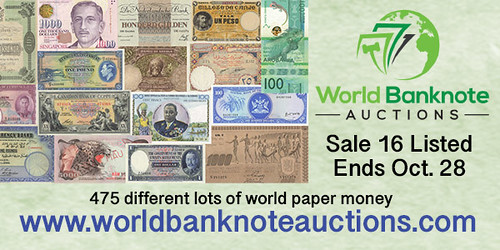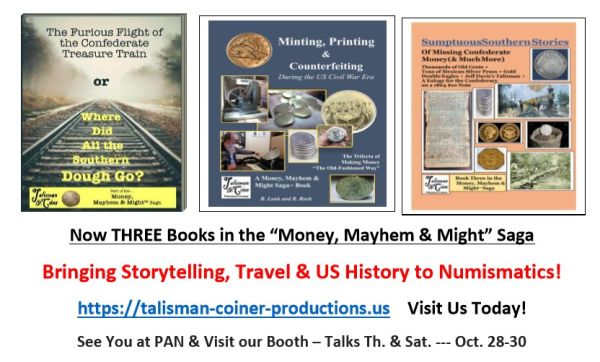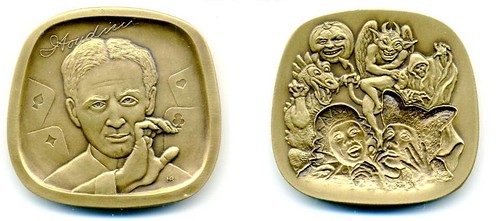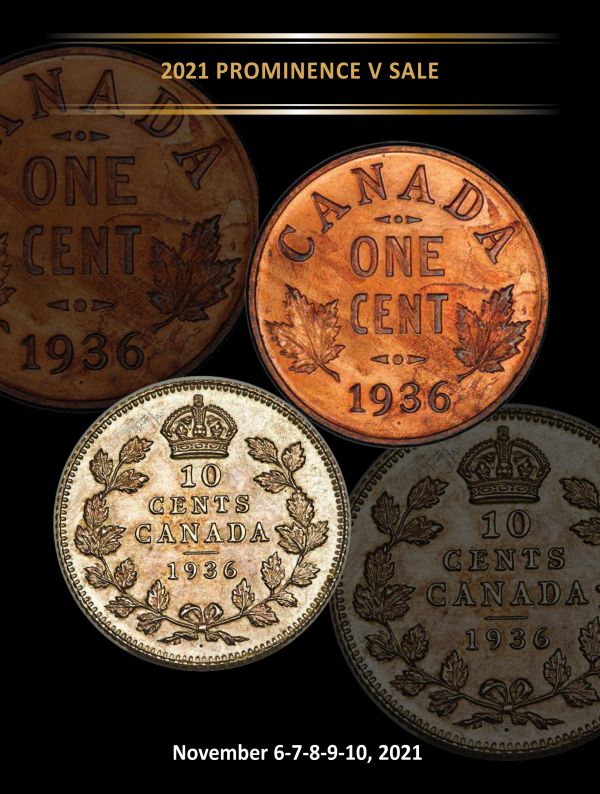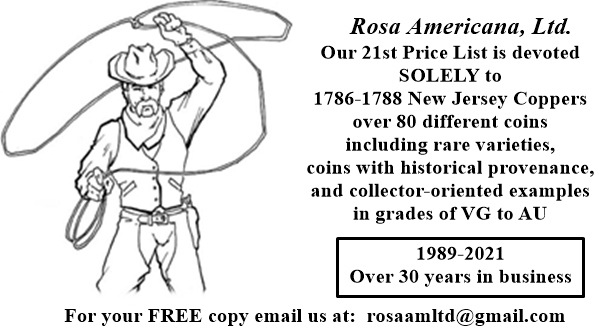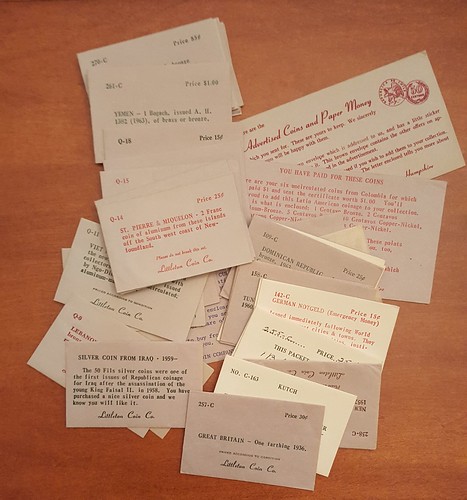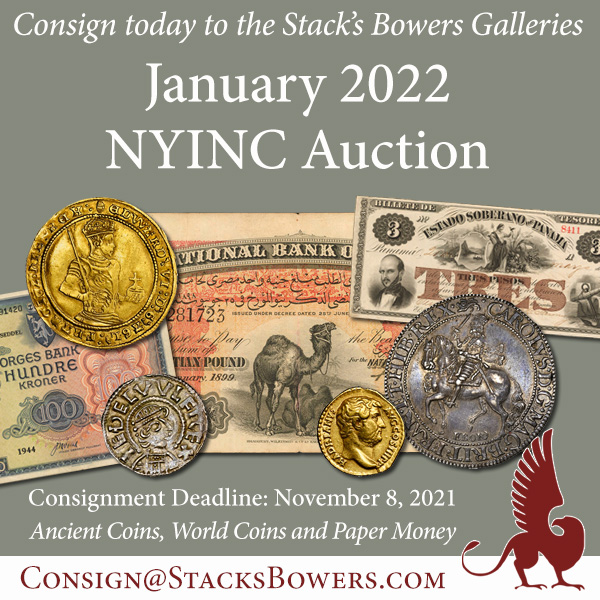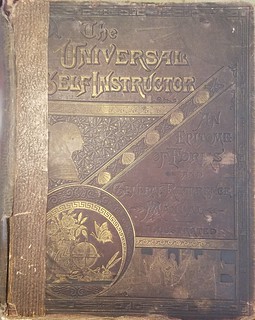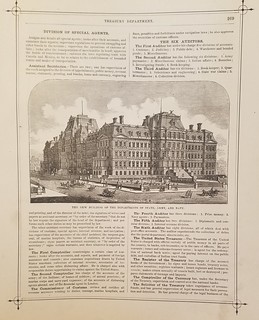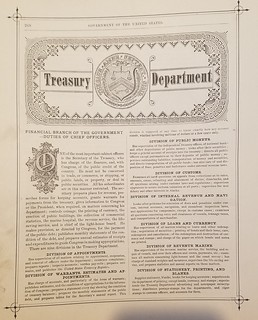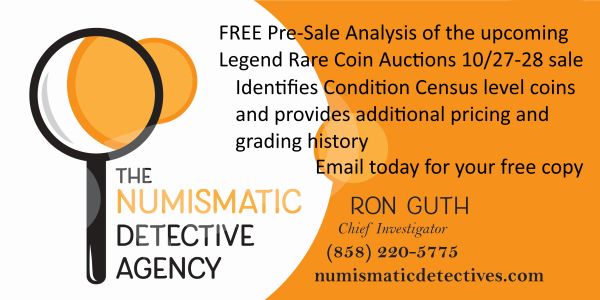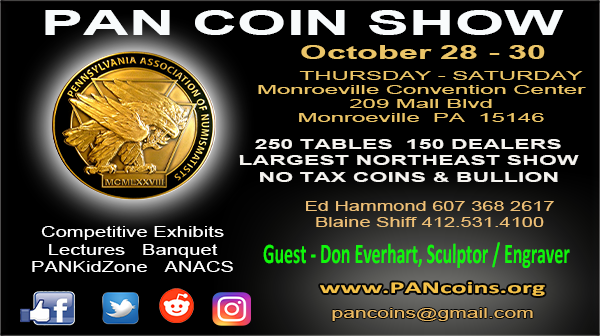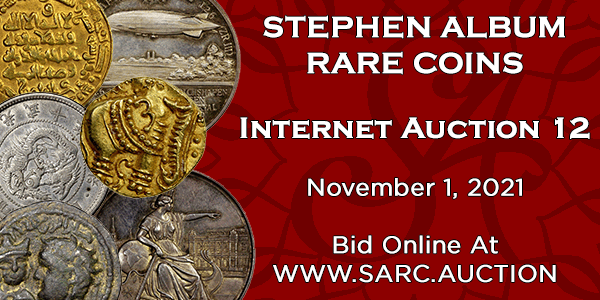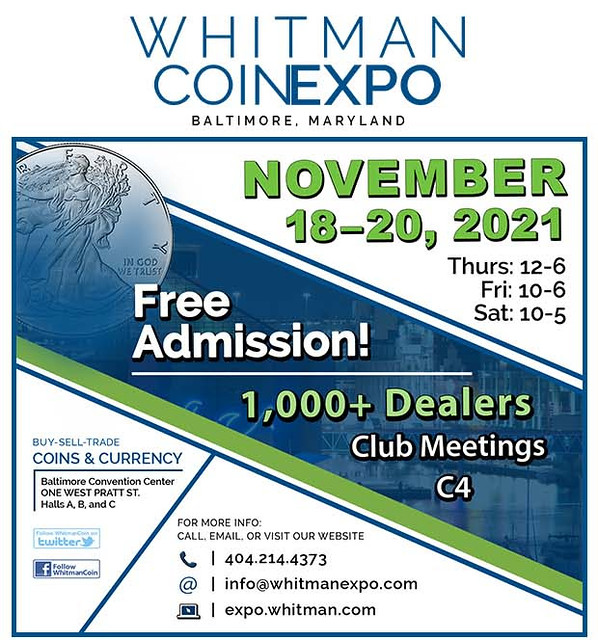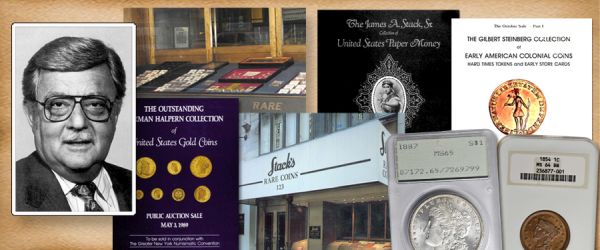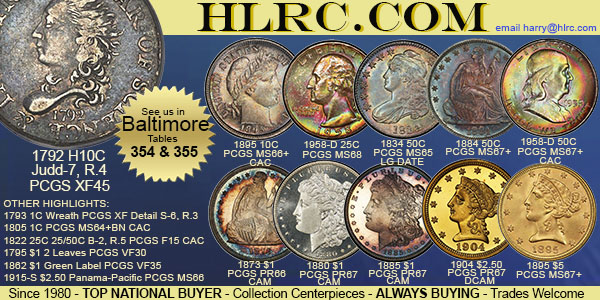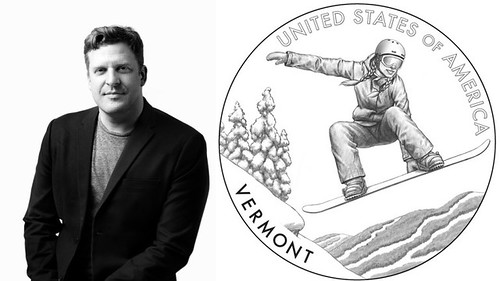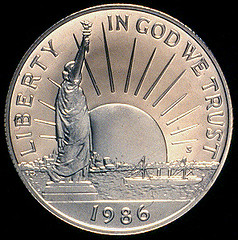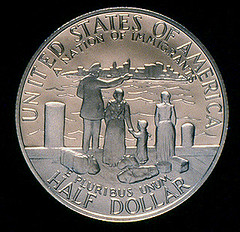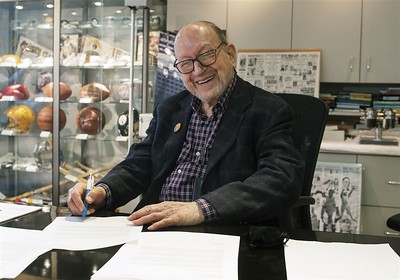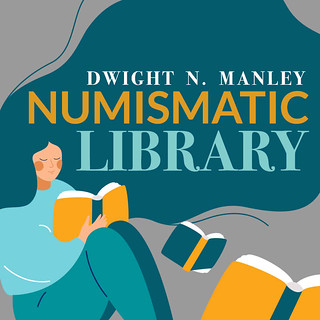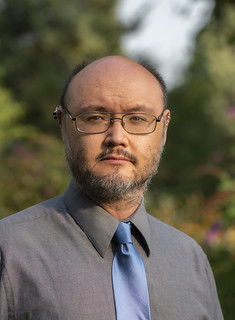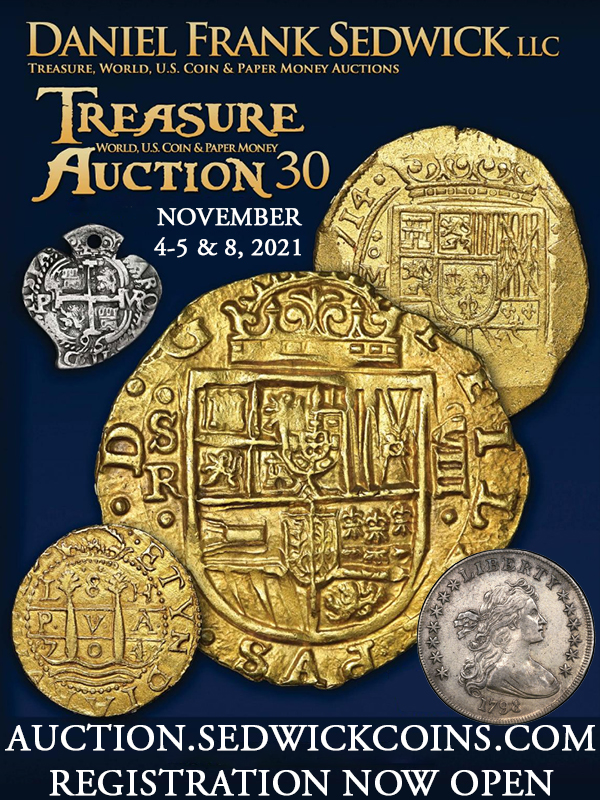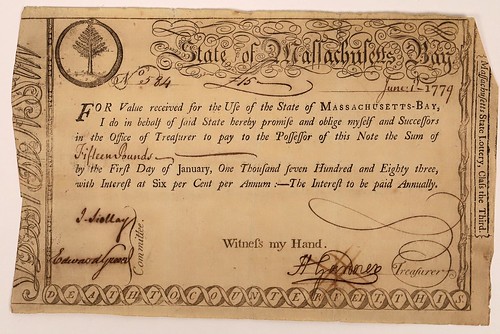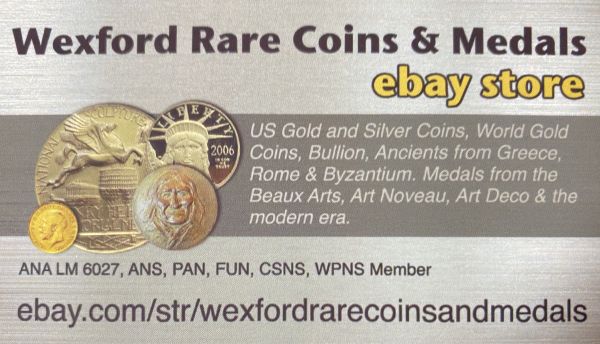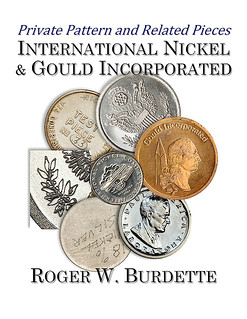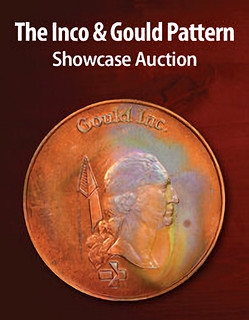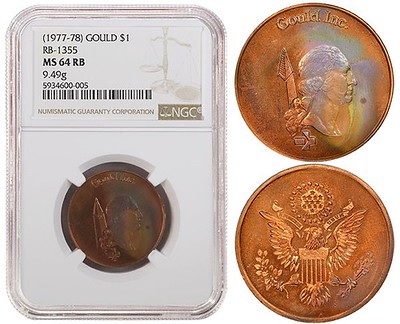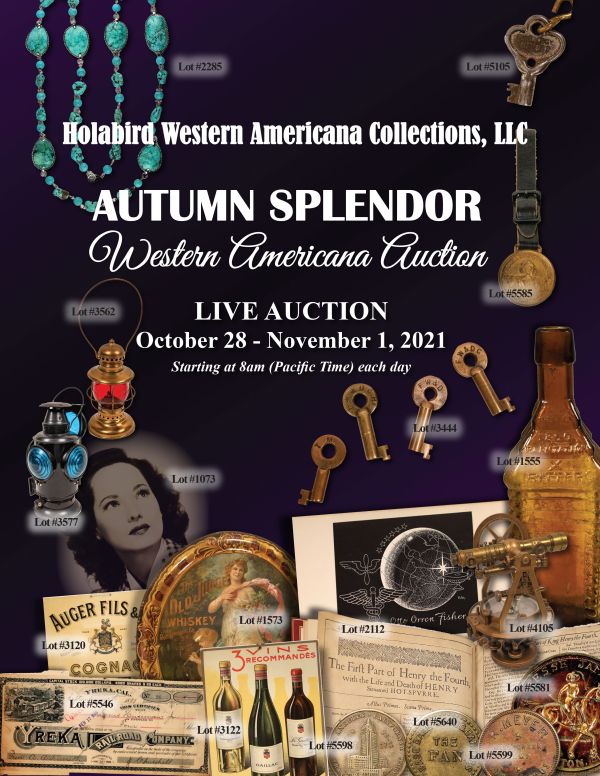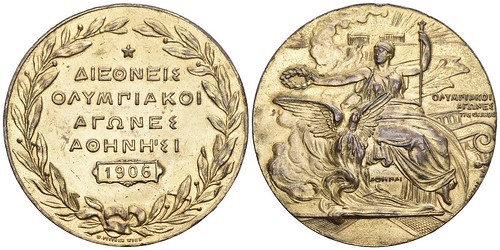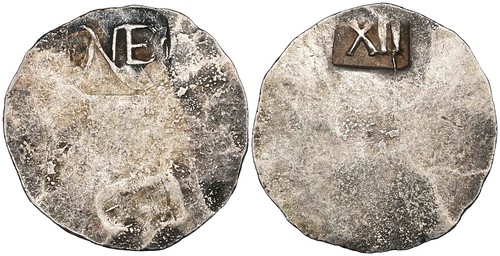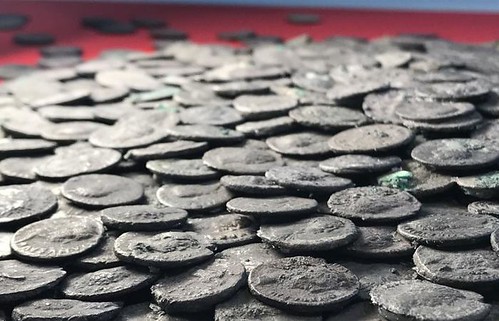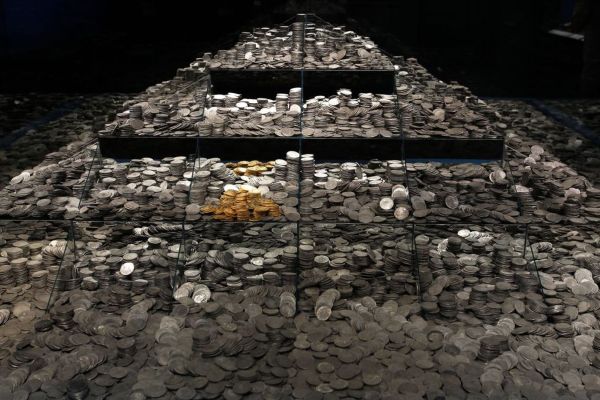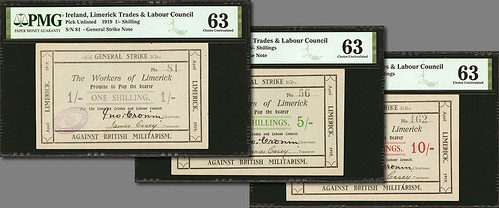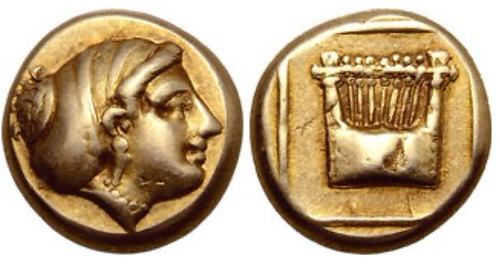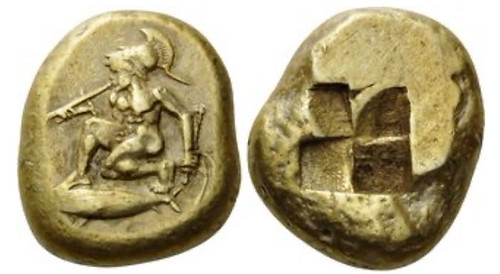
Visit our NBS Sponsors


About UsThe Numismatic Bibliomania Society is a non-profit association devoted to the study and enjoyment of numismatic literature. For more information please see our web site at coinbooks.org SubscriptionsThose wishing to become new E-Sylum subscribers (or wishing to Unsubscribe) can go to the following web page link MembershipThere is a membership application available on the web site Membership Application To join, print the application and return it with your check to the address printed on the application. Print/Digital membership is $40 to addresses in the U.S., and $60 elsewhere. A digital-only membership is available for $25. For those without web access, write to: Charles Heck, Treasurer AsylumFor Asylum mailing address changes and other membership questions, contact Chuck at this email address: treasurer@coinbooks.org SubmissionsTo submit items for publication in The E-Sylum, write to the Editor at this address: whomren@gmail.com BUY THE BOOK BEFORE THE COINSale CalendarWatch here for updates! |
- WAYNE'S WORDS: THE E-SYLUM OCTOBER 24, 2021
- GERARD AUCTION CATALOGUES 1786-91
- NEW BOOK: A GLOBAL HISTORY OF MONEY
- NEW BOOK: THE FUTURE OF MONEY
- STEPHEN MILES CARR (1951-2021)
- NEWMAN PORTAL: HOUDINI HALLOWEEN MEDAL
- VIDEO: 2021 MORGAN AND PEACE DOLLAR LAW
- PAN TALK: MONEY MATTERS OF THE CIVIL WAR
- MORE ON DEALER COIN ENVELOPES
- NOTES FROM E-SYLUM READERS: OCTOBER 24, 2021
- THE UNIVERSAL SELF INSTRUCTOR
- VOCABULARY TERM: FOUNDATION MEDAL
- MORE ON THE CHAPMAN BROTHERS
- JOHN WHITE HASELTINE (1838-1925)
- HARVEY STACK'S NUMISMATIC FAMILY, PART 107
- COIN DESIGNER JUSTIN KUNZ
- COINS FOR CONGRESS ON NATIONAL IMMIGRANT DAY
- MEET ANA LIBRARY MANAGER AKIO LIS
- ANA OPENS 2022 AWARD NOMINATIONS
- HOLABIRD AMERICANA 2021 AUTUMN AUCTION
- SELECTIONS FROM THE HOLBIRD 2021 AUTUMN SALE
- HERITAGE INCO & GOULD PATTERN AUCTION
- THE TCNC PROMINENCE V SALE
- 1886 LATIN MONETARY UNION SILVER CROWN
- OLYMPIC MEDALS IN MUENZENONLINE AUCTION 16
- FINEST KNOWN 1652 NEW ENGLAND SHILLING
- NUMISMATIC NUGGETS: OCTOBER 24, 2021
- THE SILVER TREASURE OF AUGSBURG
- SPANISH COURT RULES ON THE 'BLACK SWAN' COINS
- 1919 IRISH LIMERICK SOVIET NOTES
- LOOSE CHANGE: OCTOBER 24, 2021
- SPENDING LEGAL TENDER COMMEMORATIVE COINS
Click here to read the thin version on the web
Click here to subscribe
Click here to access the complete archive
To comment or submit articles, reply to whomren@gmail.com
Content presented in The E-Sylum is not necessarily researched or independently fact-checked, and views expressed do not necessarily represent those of the Numismatic Bibliomania Society.
WAYNE'S WORDS: THE E-SYLUM OCTOBER 24, 2021
 No new subscribers this week. We now have 6,729 subscribers.
No new subscribers this week. We now have 6,729 subscribers.
Thank you for reading The E-Sylum. If you enjoy it, please send me the email addresses of friends you think may enjoy it as well and I'll send them a subscription. Contact me at whomren@gmail.com anytime regarding your subscription, or questions, comments or suggestions about our content.
This week we open with one numismatic literature lot, two new books, an obituary, updates from the Newman Numismatic Portal, a PAN show presentation, and more.
Other topics this week include dealer coin envelopes, the Chapman Brothers, John Haseltine, Justin Kurz, Akio Lis, National Immigrant Day, ANA awards, auction previews, and spending legal tender commemorative coins.
To learn more about Mr. Gerard of Soho, the Future of Money, Houdini, the 2021 Morgan and Peace Dollars, money of the U.S. Civil War, Lucky Tillicum, Glendining's, Minnesota obsolete notes, Bret Harte, the Coin Collector's Journal, INCO test pieces, Olympic medals, Limerick Soviet notes, and shredder girls, read on. Have a great week, everyone!
Wayne Homren
Editor, The E-Sylum
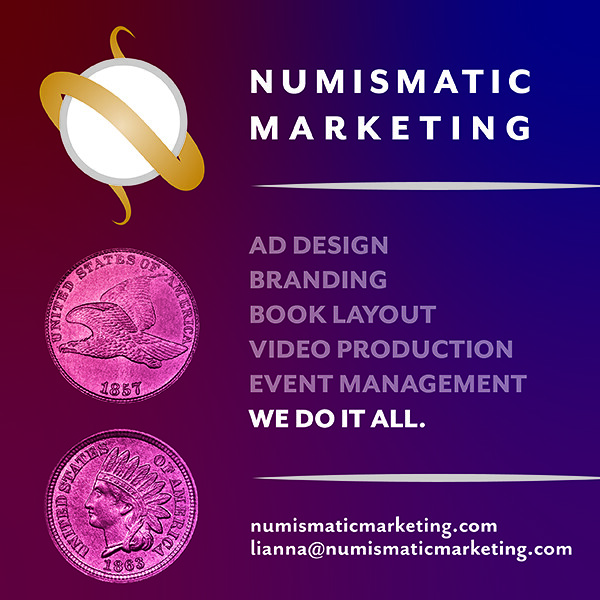
GERARD AUCTION CATALOGUES 1786-91
I poked around, and this seems to be the only lot of numismatic literature in the November 10, 2021 sale of Domenic Winter Auctioneers. But it looks like an important item, though - a bound volume of sixteen early priced and named British numismatic sale catalogues. Can anyone tell us more about Mr. Gerard of Soho? -Editor
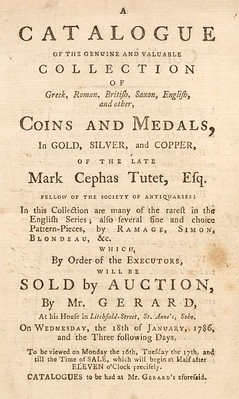 Coin & Medal auction catalogues. A volume containing 16 auction catalogues for sales of coins & medals, 1786-1791, comprising:
Coin & Medal auction catalogues. A volume containing 16 auction catalogues for sales of coins & medals, 1786-1791, comprising:
1. A catalogue of the genuine and valuable collection of Greek, Roman, British, Saxon, English, and other, coins and medals ... of the Late Mark Cephas Tutet ..., will be sold by auction, by Mr.Gerard, at his house in Litchfield Street, St. Anne's, Soho, on Wednesday, the 18th of January, 1786, and the three following days,
2. A catalogue of the valuable collection of coins, medals, antiquities, bronzes, Royal and other ancient seals, books, manuscripts, printed, &c. of Benjamin Bartlett ..., will be sold by auction, by Mr.Gerard ... on Wednesday, April 25, 1787, and the five following days, Sunday excepted,
3. A catalogue of the ... collection of coins and medals ... of the late Ralph Grey ... will be sold by auction, by Mr. Gerard ... on Thursday, the 14th February, 1788,
4. A catalogue of the genuine collection of ancient and modern coins and medals, & c. ... of the late Reverend Dr. John Pearkes ..., will be sold by auction, by Mr.Gerard ... on Thursday the 21st, and Friday the 22nd of February, 1788,
NEW BOOK: A GLOBAL HISTORY OF MONEY
A new book reviews the entire history of money to modern times. -Editor
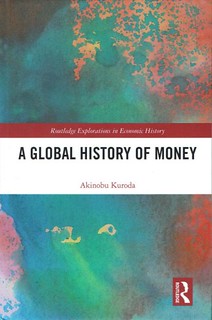 A Global History of Money
A Global History of Money
By Akinobu Kuroda
Copyright Year 2020
ISBN 9780367859237
Published April 7, 2020 by Routledge
228 Pages 35 B/W Illustrations
Book Description
Looking from the 11th century to the 20th century, Kuroda explores how money was used and how currencies evolved in transactions within local communities and in broader trade networks. The discussion covers Asia, Europe and Africa and highlights an impressive global interconnectedness in the pre-modern era as well as the modern age.
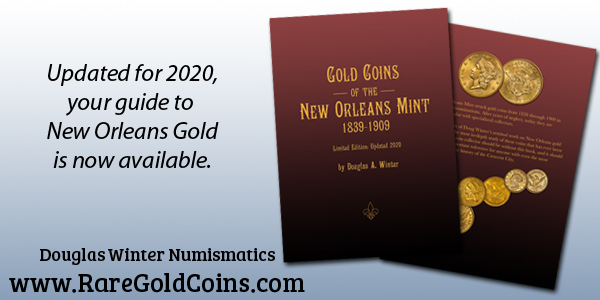
NEW BOOK: THE FUTURE OF MONEY
Picking up where Akinobu Kuroda left off, Eswar Prasad looks into the future of money. While cryptocurrency isn't directly numismatic, numismatists do care about what it means for the physical coins and other money we use today. -Editor
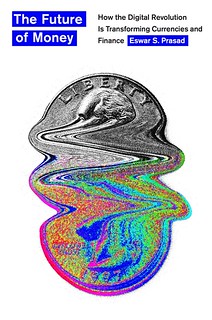 In the 13th century, Kublai Khan, grandson of Genghis Khan, created the first fiat currency, money that gets its value from the state declaring it has value. This was not the first paper money — Chinese merchants had been using deposit certificates since the 7th century. It was, however, the first not backed by any kind of commodity, such as gold, but solely the power of the state. Indeed, anyone not accepting the tokens risked being put to death. It was the birth of money as most of us know it today.
In the 13th century, Kublai Khan, grandson of Genghis Khan, created the first fiat currency, money that gets its value from the state declaring it has value. This was not the first paper money — Chinese merchants had been using deposit certificates since the 7th century. It was, however, the first not backed by any kind of commodity, such as gold, but solely the power of the state. Indeed, anyone not accepting the tokens risked being put to death. It was the birth of money as most of us know it today.
Now, according to Eswar Prasad, we are in the midst of a new revolution, this time launched by private innovation. The spark came from bitcoin in 2009, the first digital money that needed no trusted third party — whether a government, a commercial bank or payments processor such as Visa. While the libertarian ideal of its creators — a financial system free of state power — will be frustrated, he argues, the decentralised record-keeping that underpins cryptocurrencies will bring cheaper and more efficient payments.
STEPHEN MILES CARR (1951-2021)
Pete Smith submitted this obituary and remembrance of his friend Steve Carr. Thank you! -Editor
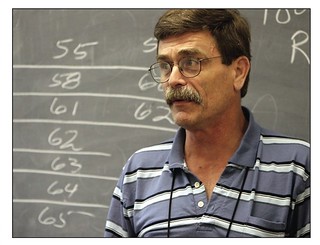 On Saturday I received the October issue of The Numismatist, somewhat delayed in the mail. I
was saddened to read of the death of an old friend, Steve Carr.
On Saturday I received the October issue of The Numismatist, somewhat delayed in the mail. I
was saddened to read of the death of an old friend, Steve Carr.
Carr was an active member of the Early American Coppers Club [EAC]. A regular feature of
Penny-Wise was Carr's Talking Beginners
articles in the late 1990's and early 2000's. Then he
and Doug Bird taught the Introduction to Early American Copper course at ANA Summer
Seminar for twenty years 1999 to 2018. He promoted exhibiting and also taught a counterfeit
detection class at EAC conventions. He contributed a column on large cents for Numismatic
News.
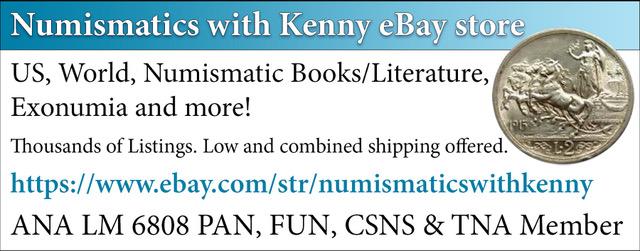
NEWMAN PORTAL: HOUDINI HALLOWEEN MEDAL
In time for the upcoming holiday Newman Numismatic Portal Project Coordinator Len Augsburger provided the following report. Thanks. -Editor
THE BOOK BAZARRE
VIDEO: 2021 MORGAN AND PEACE DOLLAR LAW
These are selections from the David Lisot Video Library that feature news and personalities from the world of coin collecting. David has been attending coin conventions since 1972 and began videotaping in 1985. The Newman Numismatic Portal now lists all David's videos on their website at:
https://nnp.wustl.edu/library/multimediadetail/522852
Here's one on Tom Uram and the 2021 Morgan and Peace Dollar Legislation. -Editor
PAN TALK: MONEY MATTERS OF THE CIVIL WAR
See last week's article (linked below) for more information on the great educational program lineup at this week's PAN show near Pittsburgh. I'll be there as well, giving a talk Friday afternoon about collector Howard Gibbs and his adventures with primitive money of the world.
Here's a press release with more information about one of the events - a series of short performances with Abe Lincoln himself about money of the Civil War. -Editor
Abe Lincoln's Legacy: Money Matters of the Civil War™
Two non-profit educational organizations
collaborate on their inaugural time travel
program. Program finds compelling
intersections between US Civil War History and Coins and Currency of today.
The Pennsylvania Association of Numismatists (PAN) and Forest Glen Commonwealth, Inc. (both 501(c)(3) not for profit organizations) are presenting a new, special, free public program suitable for all ages as part of PAN's HALLOWEEN WEEKEND COIN SHOW.
MORE ON DEALER COIN ENVELOPES
Pete Smith writes:
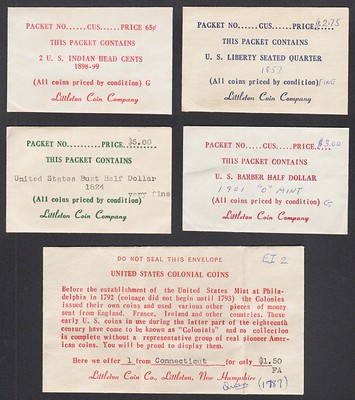 "I have seven Littleton Stamp Co. envelopes in my collection. They are about 3.25 x 5 inches.
I also have 18 from Tatham Stamp & Coin Co. They come in a variety of sizes.
"I have seven Littleton Stamp Co. envelopes in my collection. They are about 3.25 x 5 inches.
I also have 18 from Tatham Stamp & Coin Co. They come in a variety of sizes.
I was not a customer of either company in my youth. I acquired them from coins acquired when I worked for Grove Coin."
Dave Lange writes:
"Littleton's business model evidently was borrowed from Tatham, as their market (beginners and casual collectors) and method (elaborate catalogs of common items available in bulk) are nearly identical. It's no surprise that Littleton rose to prominence when Tatham began to fade in the late 1950s following the suicide of its owner."
At the 2015 ANA I discussed the topic with Ken Bressett and Littleton Public Relations Manager Jill Kimball. -Editor
"Ken Bressett told us he'd once worked for the Tatham Coin Company attributing ancient coins - he'd typed up descriptions on Tatham envelopes! And Jill told us that Maynard Sundman had modeled the Littleton company after the mail order format of Tatham. Those little envelopes have had impact down to the present day."
Bruce Bartelt writes:
"David Lange's note brought back memories from my youth. I purchased primarily foreign coins from Littleton in the 1960s, and retained a number of the envelopes after transferring the coins to 2x2s at some time. A careful search of my archives (aka an archaeological dig through a box in the back of my closet) turned up these. I must have known they would have significance some day!"
To read the earlier E-Sylum articles, see:
WAYNE'S NUMISMATIC DIARY: AUGUST 16, 2015 : Whitman
(https://www.coinbooks.org/esylum_v18n33a15.html)
VINTAGE COIN ENVELOPES
(https://www.coinbooks.org/v24/esylum_v24n42a10.html)
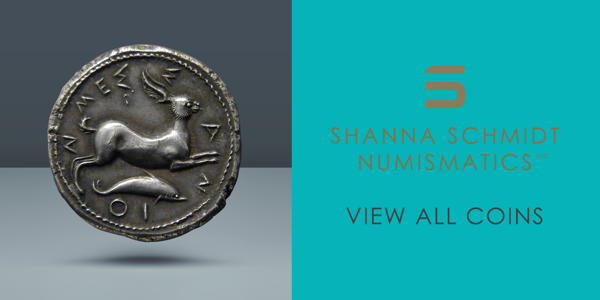
NOTES FROM E-SYLUM READERS: OCTOBER 24, 2021
More on Tom Fort
Joel Orosz writes:
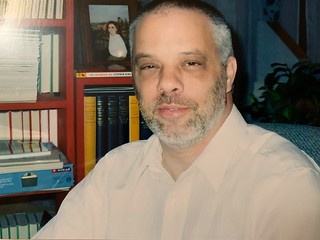 "I was shocked to read in The E-Sylum that Tom Fort has passed away. He was three years younger than me--the very definition of leaving us too soon. I enjoyed my visit to the "Fort Memorial Library" during the 2004 Pittsburgh ANA, and never dreamed that this ironic designation would become sadly apposite so soon.
"I was shocked to read in The E-Sylum that Tom Fort has passed away. He was three years younger than me--the very definition of leaving us too soon. I enjoyed my visit to the "Fort Memorial Library" during the 2004 Pittsburgh ANA, and never dreamed that this ironic designation would become sadly apposite so soon.
I last saw him several years ago, when I took him and one of his friends to lunch in Kalamazoo during a break from their presentations at the Medieval Institute held annually at Western Michigan University. He was, as Kenny Lowe would have said, a mensch, and will be remembered as a fine editor of The Asylum."
Indeed. I was able to attend services for Tom this past Wednesday. Don Carlucci, Chairman of the Board of the Pennsylvania Association of Numismatists gave a wonderful eulogy. Tom will be in our hearts and on our minds at this week's PAN show. -Editor
To read the earlier E-Sylum article, see:
EDWARD TOMLINSON FORT (1961-2021)
(https://www.coinbooks.org/v24/esylum_v24n41a04.html)
Other topics this week include Lucky Tillicum, Glendining's, and Evelyn's 1697 Numismata. -Editor
THE UNIVERSAL SELF INSTRUCTOR
"I just bought an 1883 book at a flea market. The topics covered are quite broad. I am sending you the sections on the Treasury Department, banking, and exchange rates. I thought that readers might enjoy seeing this period information."
Thanks! I hadn't seen this book before. Seems like a good compilation of general information. -Editor
VOCABULARY TERM: FOUNDATION MEDAL
Here's another entry from Dick Johnson's Encyclopedia of Coin and Medal Terminology. -Editor
Foundation Medal. A medallic item along with other artifacts that are placed in a chamber of a new building's foundation, usually a cornerstone. The objects are somewhat of a time capsule to be examined at a later time – it is never known at the time of their entombment when they will see the light of day again. Sometimes the objects are lost track of, however building demolition workers know where to look and attempt to retrieve such artifacts. Often when these items are examined they are of less value and historical importance than expected. Medals are often the most relative artifact (and often the most indestructible) as paper items or other media may not endure the years of confinement. Such foundation medals, however, become artifacts for those that are recovered.
The custom of placing items in cornerstone or foundation goes back at least to the 15th century. One of the earliest foundation medals was a portrait of Filippo Strozzi, a merchant prince of Florentine, 1489. The artist is unrecorded but it is in the manner of Niccolo Fiorentino, made for the completion of the prince's palace, inaugurated August 6, 1489. (Kress A1024.286A).
MORE ON THE CHAPMAN BROTHERS
American Numismatic Biographies author Pete Smith submitted this follow-on to his article last week on the Chapman Brothers. Thanks! -Editor
My article on the Chapman Brothers ran in The E-Sylum on the evening of October 17, 2021. The first correction came the next morning.
JOHN WHITE HASELTINE (1838-1925)
Pete Smith submitted this article on Philadelphia dealer John Haseltine. Thanks! -Editor
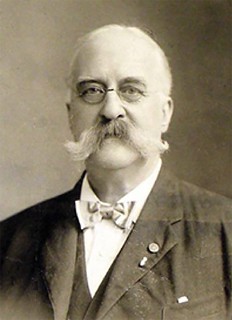 John W. Haseltine was an important coin dealer in the late nineteenth century. He was born in Philadelphia on
September 6, 1838. His father, John William Haseltine (1793-1871) was a successful businessman and his mother,
Elizabeth Stanley Shinn (1811-1882) was an amateur landscape painter. White was a grandmother's maiden name.
John W. Haseltine was an important coin dealer in the late nineteenth century. He was born in Philadelphia on
September 6, 1838. His father, John William Haseltine (1793-1871) was a successful businessman and his mother,
Elizabeth Stanley Shinn (1811-1882) was an amateur landscape painter. White was a grandmother's maiden name.
Haseltine married Rose Amelia Idler, daughter of coin dealer William Idler on June 9, 1869. They had one daughter, Marion Lucy, born on June 21, 1870, who married Thomas T. Richards.
Haseltine acquired some rare coins through Stephen K. Nagy. Walter Breen identified Nagy as Haseltine's son-in- law. A search of genealogy references concludes that this was not true. Nagy was married in 1909 to Gertrude B, Devere, daughter of William H. Devere and Wilhelmina Weldy.
HARVEY STACK'S NUMISMATIC FAMILY, PART 107
The latest article in Harvey Stack's blog series covers the remainder of the banner auction year of 1989. Thanks, Harvey! -Editor
As our public auction schedule for 1989 continued, in July we again joined with our partners, as each firm presented 500 lots in the now very popular annual Apostrophe Auction – Auction '89. Once again, this pre-ANA event in conjunction with RARCOA, David Akers and Superior attracted a lot of attention and was attended by many who wanted to acquire some of the rarities we jointly offered. Our September sale of 1,685 lots started our fall session. This was a "something for everyone" sale that offered United States gold, silver and copper coins, along with U.S. paper money.
COIN DESIGNER JUSTIN KUNZ
Regular readers know I enjoy finding articles about coin designers in their hometown newspapers. These articles often provide far more information than the short profiles found in press releases or even in the numismatic press. Here's an interview with Justin Kunz, designer of new snowboarding dollar coin and over a dozen other coins and medals. -Editor
The U.S. Mint recently announced the latest dollar coins in the American Innovation series for the year 2022 and on the list was one dedicated to Vermont. The subject matter could have gone a number of ways — maple syrup, tractor technology, Bernie Sanders's mittens — but thankfully the design features snowboarding! Gov. Phil Scott expressed pride and support for the sport, saying, In many ways, Vermont is the birthplace of modern snowboarding, and this coin represents Vermont's contributions to the sport, from physical innovations in boards and bindings to the creativity and athleticism showcased by Vermonters — and others who train in the Green Mountains — in competition on the world stage.
The official release date is yet to be announced, so while we patiently wait, I reached out to the artist, Utah-based Justin Kunz, to learn more about how the design came to be.
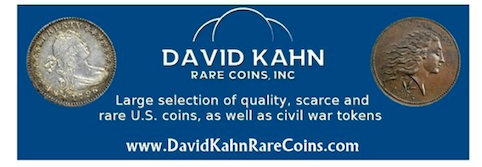
COINS FOR CONGRESS ON NATIONAL IMMIGRANT DAY
The Pittsburgh Post-Gazette published an article today about a successful local businessman giving commemorative half dollars to members of Congress -Editor
Mr. Kotovsky happens to be a first-generation American born of a Lithuanian mother and Ukrainian father. The United States' immigrant heritage is extremely important to him. So, in honor of National Immigrant Day on Oct. 28, Mr. Kotovsky set out to remind politicians about where they come from by sending every U.S. senator and House of Representatives member a commemorative half-dollar coin that he believes is emblematic of that legacy.
The message is short and sweet: We're a nation of immigrants,
he told the Post-Gazette. I think the diversification of immigrants made us the greatest country in the world. I would just like people not to forget that.
He and Tracy Kosylo, Modular International's marketing manager, spent much of Monday, Oct. 11, putting together envelopes with the coins and letters that Mr. Kotovsky wrote to each senator and representative that they want to reach all those politicians by National Immigrant Day.

MEET ANA LIBRARY MANAGER AKIO LIS
The October 2021 issue of The Numismatist from the American Numismatic Association has a profile of the new ANA Library Manager. Welcome, Akio Lis! Thanks to Numismatist Editor Caleb Noel and Editorial Assistant Sydney Stewart for providing the text and portrait for republication here. -Editor
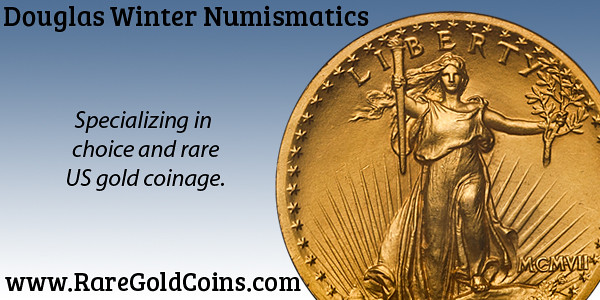
ANA OPENS 2022 AWARD NOMINATIONS
Put on your thinking caps, folks. Who would be deserving winners of next year's ANA awards? Who would you like to nominate? It's not hard, but does require some paperwork. Start gathering information about your candidate(s). -Editor
Deadline for Award Nominations is Jan. 15
Each year, the American Numismatic Association (ANA) presents awards to deserving individuals in recognition of outstanding dedication to numismatics. The ANA is now accepting individual nominations for 2022 awards and Numismatic Hall of Fame "Historic Era" candidates.
All nominations can be submitted in writing and online – 300 words or more for the Numismatic Hall of Fame, and 50-100 words for all other awards. Nominations are accepted through Jan. 15, 2022.

HOLABIRD AMERICANA 2021 AUTUMN AUCTION
Holabird Americana's sales cover a lot of collecting ground. There are always some numismatic items on offer along with a fascinating array of other collectibles and ephemera including stock certificates, postcards and a host of items numismatists often acquire as association items. Here's the press release for their upcoming sale. -Editor
HOLABIRD WESTERN AMERICANA COLLECTIONS WILL HOLD A HUGE, FIVE-DAY AUTUMN SPLENDOR WESTERN AMERICANA AUCTION, OCTOBER 28-NOVEMBER 1
The auction has more than 3,200 lots in a wide array of collecting categories and at price points that will appeal to both novices and veteran collectors alike. Important collections will be sold.
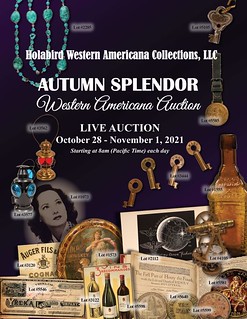 Holabird Western Americana Collections' five-day Autumn Splendor Western
Americana Auction, October 28th -November 1st , is packed with over 3,200 lots of Americana,
railroadiana, mining collectibles, numismatics, stock certificates, rare books, art and more, online
and live in the Reno gallery at 3555 Airway Drive, starting at 8 am Pacific time all five days.
Holabird Western Americana Collections' five-day Autumn Splendor Western
Americana Auction, October 28th -November 1st , is packed with over 3,200 lots of Americana,
railroadiana, mining collectibles, numismatics, stock certificates, rare books, art and more, online
and live in the Reno gallery at 3555 Airway Drive, starting at 8 am Pacific time all five days.
The massive sale will feature several important collections, beginning with the Stuart Scotty
MacKenzie Montana collection. Stuart was a lawyer, inveterate collector and dealer. He
scoured the backroads of northern Montana looking for documents, archives, company files,
libraries, correspondence – most anything historical except bottles and tokens.
SELECTIONS FROM THE HOLBIRD 2021 AUTUMN SALE
Whew. Now for some additional numismatic lots that caught my eye in the upcoming Holabird sale. -Editor
Lot 4379: Massachusetts Bay Lottery Certificate
No. 584, issued for 15 pounds on June 1, 1783, signed by H. Gamore(?) as treasurer. Nice vignette of a pine tree encircled by a rattlesnake engraved by Nathaniel Hurd. This bond was issued to pay the winners in the state lottery. Cut roughly, otherwise fine!
To read the complete lot description, see:
State of Massachusetts Bay Lottery Certificate, 1783 [130264]
(https://holabirdamericana.liveauctiongroup.com/State-of-Massachusetts-Bay-Lottery-Certificate-1783-130264_i4322594)
HERITAGE INCO & GOULD PATTERN AUCTION
The November 1, 2021 Heritage Inco & Gould Pattern Showcase Auction features many pieces examined and illustrated Roger Burdette's 2019 book Private Pattern and Related Pieces: International Nickel & Gould Incorporated. An article from NGC has more information. -Editor
More than 150 patterns and blank planchets that were created amid major changes in US coinage in the 1960s and 1970s — all certified by Numismatic Guaranty Company™ (NGC®) — are being offered in a Heritage Auctions sale. Bidding is already underway for the INCO and Gould Patterns Showcase Auction, which concludes on November 1, 2021.
Among the highlights is a (1977-78) Gould $1 graded NGC MS 64 RB (lot 46127) with impressive copper toning. In the 1970s, Gould Inc. struck tokens such as this one showing George Washington in order to demonstrate new compositions for planchets. At the time, the US Mint was considering how to shrink the Eisenhower Dollar, which many people found too inconvenient to carry around.
THE TCNC PROMINENCE V SALE
The Canadian Numismatic Company is holding a major sale in November. -Editor
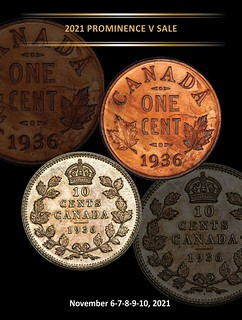 This auction of more than 1500 numismatic lots features two major collections joined by selections from 62 other consignors across North America. The first and second Sessions are highlighted by three attractive coin and banknote collections. The
This auction of more than 1500 numismatic lots features two major collections joined by selections from 62 other consignors across North America. The first and second Sessions are highlighted by three attractive coin and banknote collections. The Moody Collection
of Canadian Coins, The Montreal Collection
of Canadian banknotes and the Little Collection
Part II of Canadian Copper coins.
Also featuring in this auction; The Holy Grail of Canadian coins, the famous 1936 Dot 1 cent in Gem Specimen-65, the elusive 1936 Dot 10 cents in Specimen-63+. A scarce 1937 brass penny in Specimen-66 from The Paris Mint. A superb 1948 Specimen set in Gem condition, a very scarce 1908c-Sovereign in Gem Specimen-65 and an ultra rare example of a 1909c-Sovereign in Specimen-64. An 1886 Obverse 2 in Choice condition, a fantastic pair of 1886 25 cents obverse 4 &5 in Superb Gem Mint State-65, some beautiful key dates 1889 and 1884 10 cent pieces in Choice Mint State-62, a very rare 1858 20 cents Pattern, some unusual Test tokens, an 1885 small 5/5 5 cents in Mint State-62, a 1935 dollar in Superb Gem Mint State-67 and so many more. In addition, a superb selection of very scarce Proof banknotes and several others including Rare Serial number issues and error notes.
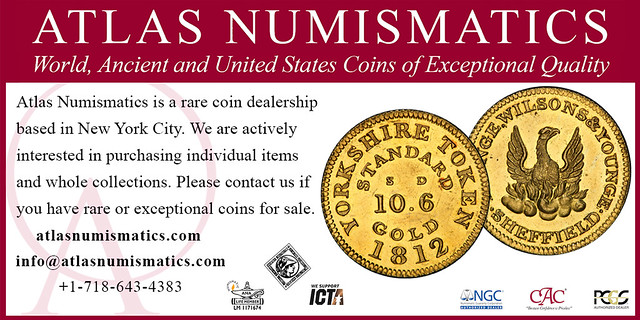
1886 LATIN MONETARY UNION SILVER CROWN
Here's a great article by Ursula Kampmann on a rare silver crown and its relation to the Morgan dollar. -Editor
Gold, Silver, the Morgan Dollar and the Rarest Silver Crown of the Latin Monetary Union
On 16 November 2021, Numismatica Genevensis will be auctioning a very important rarity: 5 francs, 1886 – the rarest silver crown of the Latin Monetary Union. Produced around the same time as the Morgan dollar, its rareness also shares the same economic and historical background: the overproduction of silver in the American town of Virginia City, Nevada.
By Ursula Kampmann
Sponsored by Numismatica Genevensis
On 16 November 2021, Numismatica Genevensis will be auctioning a very important numismatic rarity. It is the rarest silver crown of the Latin Monetary Union. Only five specimens of this 5-franc coin from 1886 are known: three of them are located in Switzerland's most important museums. Only two of them are in private hands. And now, for the first time since 2008, one of those two specimens is coming onto the market.
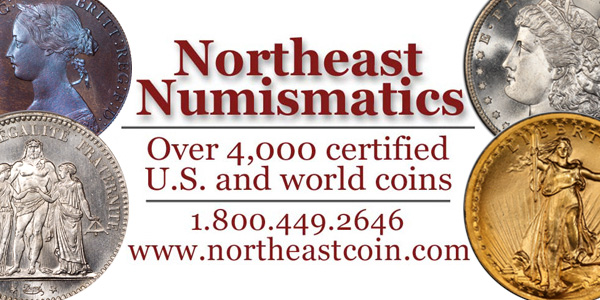
OLYMPIC MEDALS IN MUENZENONLINE AUCTION 16
Münzen & Raritätenshop GmbH of Bern Switzerland are offering a selection of Olympic related medals in their Auction 16 November 26-27. Here are a few that caught my eye. -Editor
Lot 4: Athens 1906

FINEST KNOWN 1652 NEW ENGLAND SHILLING
The 1652 New England shilling recently discovered in the United Kingdom has been confirmed as the finest-known example of the first coin struck in what is now the US. It is due to be auctioned online on Friday November 26 by Morton & Eden of London. It is estimated to bring £150,000-200,000 (US$200,000-300,000). An ancestor of the current owner was an early settler in New England.
Morton & Eden kindly provided this preview draft of the catalogue description. Thank you. Great discovery! -Editor
The Property of the Hon. Wentworth Beaumont
U.S.A., Colonial North America, New England, shilling, undated, struck in Boston in 1652 by John Hull and Robert Sanderson, the silver planchet countermarked ‘NE' on obverse and ‘XII' on reverse, 72.2 gr. (Noe 3-B; Salmon 3-C), the finest known example of the first coin struck in what is now the U.S.A., recently discovered in the UK and now in NGC holder graded MS61, extremely rare and the only New England shilling to have been classed as ‘Mint State' by either grading service £150,000-200,000

NUMISMATIC NUGGETS: OCTOBER 24, 2021
Here's a selection of interesting or unusual items I came across in the marketplace this week. Tell us what you think of some of these. -Editor
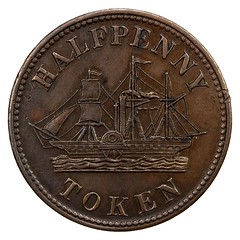
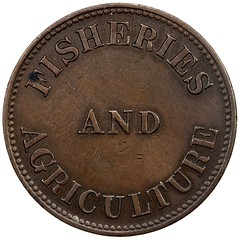
PRINCE EDWARD ISLAND: AE halfpenny token, ND (1858), Ch-PE-8A2, Breton-921, Steamship sailing left, Fisheries & Agriculture type, thin flan variety, EF to About Unc. The last token of Prince Edward Island was issued about 1858. Probably issued by James Duncan & Co., a hardware merchant in Charlottetown. It seems that after 1858 Prince Edward Island was amply supplied with copper for there were no more halfpenny issues. The official adoption of the decimal system in 1871 rendered these tokens obsolete.
A nice token from the Stephen Alpert Internet 12 sale. Great detail on the ship. -Editor
To read the complete lot description, see:
PRINCE EDWARD ISLAND: AE halfpenny token, ND (1858). EF-AU
(https://www.sarc.auction/PRINCE-EDWARD-ISLAND-AE-halfpenny-token-ND-1858-EF-AU_i43272490)
Other topics this week include the Idler Dealer In Coins token, and World War II ration tokens. -Editor
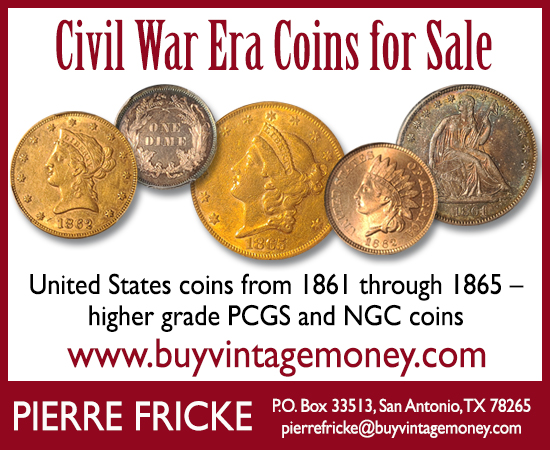
THE SILVER TREASURE OF AUGSBURG
Researchers in Germany as studying a large hoard of Roman silver coinage discovered in Augsburg. Found via The Explorator newsletter. To subscribe to Explorator, send a blank email message to: explorator+subscribe@groups.io. -Editor
More than 15 kilograms of silver coins from Roman times have been discovered in Augsburg. There is talk of the largest Roman silver treasure in Bavaria. Researchers hope to gain new insights into the life of the Romans.
Stefan Krmnicek from the Institute for Classical Archeology at the University of Tübingen turns the lock on the safe, enters a numerical code, then pushes a lever to the side and pulls the centimeter-thick steel door open. Together with his doctoral student Leo Brei, he enters the university safe. The coins from Augsburg are ready for restoration in five gray plastic boxes. It is the largest Roman silver treasure that has been found on Bavarian territory to date. Each coin is individually packed in a plastic bag and numbered. There are around 5500 coins in total.
THE BOOK BAZARRE
SPANISH COURT RULES ON THE 'BLACK SWAN' COINS
Here's an English version of an article from Spain about a recent Spanish court ruling related to the Nuestra Señora de las Mercedes "Black Swan" shipwreck. -Editor
The history of the Spanish frigate Nuestra Señora de las Mercedes includes two grievances and one victory. The first of the former was when the British Navy sunk it and its 275 crew members on October 5, 1804, off Portugal's Algarve coast. The second offense came in May 2007, when the US treasure-hunting company Odyssey Marine Exploration scooped up its cargo of 500,000 silver and gold coins from the shipwreck at the bottom of the sea. In order to conceal the origin of the treasure, the company used the code name Black Swan for the recovery project.

1919 IRISH LIMERICK SOVIET NOTES
Stack's Bowers Paper Money Researcher & Cataloger Christopher Dahncke published a blog article on the 1919 Irish "Limerick Soviet" notes. I was unaware of this event. interesting political/emergency issue. -Editor
Our January 2022 Official Auction of the New York International Numismatic Convention is shaping up to be another fantastic sale, with offerings of rarities from a multitude of countries. One such treasure we are pleased to offer is this set of 1, 5 & 10 Shillings from the civil disobedience period in Ireland.

LOOSE CHANGE: OCTOBER 24, 2021
Here are some additional items in the media this week that may be of interest. -Editor
This week Mike Markowitz published a new article in his CoinWeek Ancient Coin Series on musical instruments on ancient coins. Check it out! -Editor
MUSIC IS MUCH older than civilization — it may be as old as language itself. The earliest known musical instrument, a flute made from a bear's shinbone found in 1995 in a cave in Slovenia, dates from 43,000 years ago[1]. In the ancient world, musical instruments played important roles in worship and warfare as well as entertainment, and we see them depicted on a wide range of coins. In modern times, one of the most popular collectible bullion coins is the Vienna Philharmonic
(Wiener Philharmoniker) issued since 1989 by the Austrian Mint. The reverse bears a horn, bassoon, harp, and four violins centered around a cello.
By far the most common musical instrument seen on ancient coins is the lyre, a kind of harp with a hollow soundbox, two curved arms, a crossbar, and between three to 12 gut strings that were strummed or plucked with a pick (plectrum). Seven strings were common. The second-century astronomer Claudius Ptolemy even put one in the northern sky, the constellation Lyra.
To read the complete article, see:
Music on Ancient Coins
(https://coinweek.com/ancient-coins/music-on-ancient-coins/)
Other topics this week include Thames Tunnel medals, and Travels With George Washington. -Editor

SPENDING LEGAL TENDER COMMEMORATIVE COINS
This article from The Sun discusses a recent instance of someone spending Royal Mint legal tender commemorative coins. -Editor
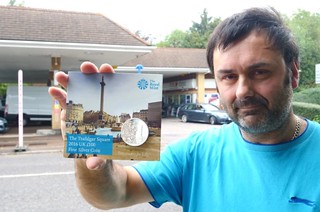 A COLLECTOR nicked for using a £100 commemorative coin to buy fuel has won a £5,000 payout from cops.
A COLLECTOR nicked for using a £100 commemorative coin to buy fuel has won a £5,000 payout from cops.
Brett Chamberlain, 54, was thrown out by staff who said it wasn't real money.
He was then interrogated
at a police station.
But the Trafalgar Square special edition, with 45,000 minted in 2016, is legal tender under a 1971 Act.


